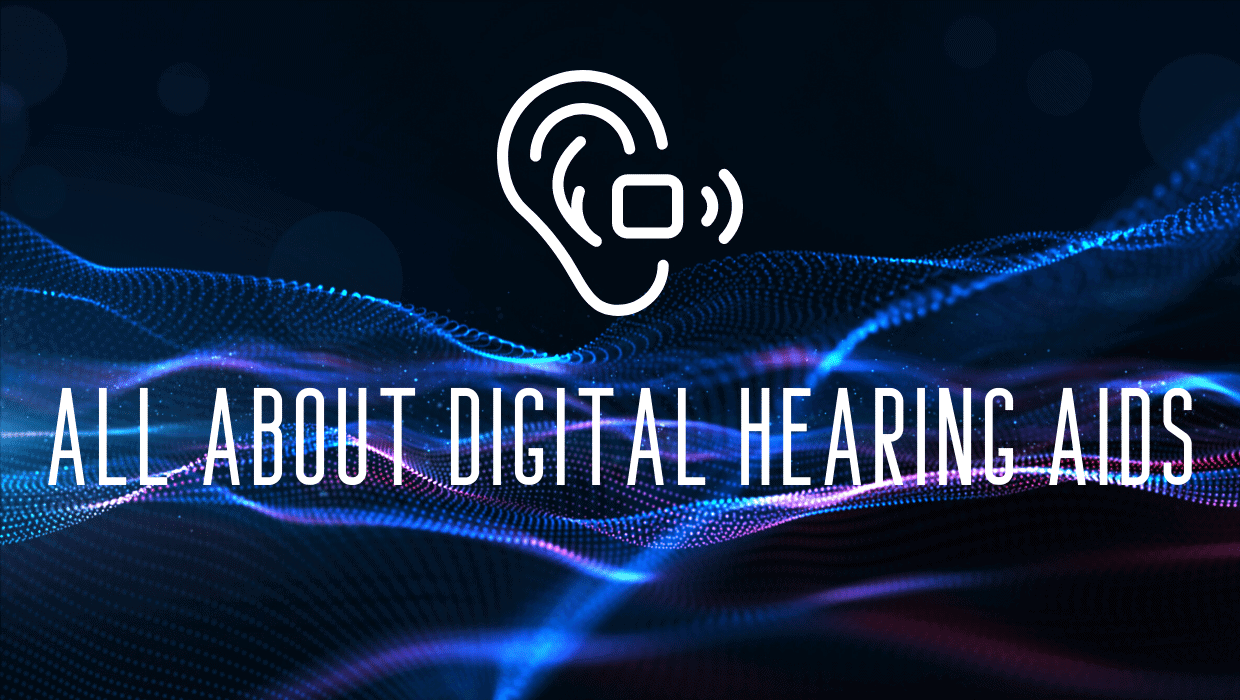- How Fast Can Hearing Loss Progress? - April 10, 2024
- Movie Enjoyment for Hearing Aid Users - March 13, 2024
- Predicting the Future of Hearing Healthcare - February 14, 2024
Hearing aid technology is improving every day. Every year new and exciting advancements are changing what we think about hearing aids. You’ll find a number of rechargeable hearing aids that can power complex programs and settings without the tiny disposable batteries. You’ll also find hearing aids that offer seamless connectivity to your smartphone, so you can stream audio from your phone straight to your hearing aids. One of the most influential developments in hearing technology was the development of digital hearing aids.
Analog Hearing Aids
To understand digital hearing aids, let’s first take a look at analog hearing aids. These hearing aids are the devices you probably picture when you think of hearing aids. Analog technology works by making sound waves larger. This amplifies all the sounds around you and makes them louder. When sounds are louder, it can be easier to hear the sounds you’re straining to hear.
Analog hearing aids of the past were much larger than modern hearing aids. These hearing aids had buttons on the sides to adjust the settings. Analog hearing aids could be programmed with several different settings, and a push of a button could change the settings to help you hear. These changes in settings help you hear in a noisy restaurant, a large open space like an auditorium, or in the quiet of your own home. Settings had to be changed manually, and you needed to change settings every time the listening environment changed.
Digital Hearing Aids
Digital hearing aids were first available in 1996, and since then they’ve dominated the hearing aid market. Digital hearing aids don’t just amplify sounds. Instead, they have a small computer chip in the device that converts the sound waves into digital units. Digital hearing aids break up the sound waves into these smaller units by analyzing and separating sounds. For example, digital technology can distinguish between background noise and speech sounds. Rather than amplifying all the sounds, digital hearing aids can reduce background noise and amplify the sounds you want to hear.
Digital technology will process sounds rather than simply amplifying them. This means your hearing aids can run complex programs to help you hear better than ever before. They’re also easier to program to your unique hearing loss, helping you hear the sounds you’re missing without over amplifying sounds you can hear clearly.
With digital hearing aids, you’ll enjoy noise reduction programs and rapid processing. Directional microphones will make it easy to focus on sounds in front of you, while reducing the volume of sounds coming from behind you. Finally, speech enhancement programs help you catch every word in conversations, even in places with a lot of background noise.
Going Digital with Your Hearing Aids
Most modern hearing aids use digital technology to help you hear. There are different levels of digital technology, from basic hearing aids to advanced hearing technology with the most sophisticated programs and settings. Digital hearing aids work much better than analog hearing aids. Not only do they have increased processing capacity, digital hearing aids also make it easy to hear the sounds you want to hear.
Digital hearing aids are smaller than ever before. Some models are so small they sit in your ear canal where they’re nearly invisible. Digital hearing aids often adapt to the environment you’re in, changing between programs and settings to give you a great listening experience. You won’t need to lift a finger to have great hearing everywhere you go. When you do need to manually change the settings, you can control your hearing aids from an app on your phone.
Are You Ready for Digital Hearing Aids?
Most of today’s hearing aids are digital devices. We have a selection of digital devices from entry level hearing aids to the most powerful and advanced devices. These hearing aids can be customized to your unique hearing loss, with programs and settings calibrated to match your exact hearing needs. Digital hearing aids will let you connect with the world around you in a whole new way, and hear all the sounds you’ve been missing.
When you’re ready to go digital, contact us and we can help you find the perfect hearing aids for your lifestyle and hearing needs.

